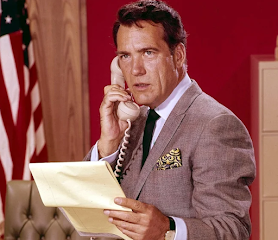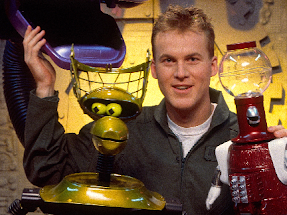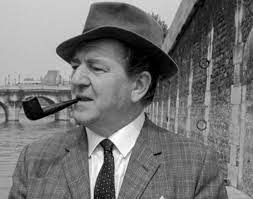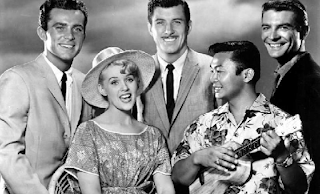Time flies. It was ten years ago that I prepared my Top Ten list that's been residing over there on the sidebar. Most of those shows had been part of my informal top ten, the one I kept in my head, for years, and given my disinclination to watch contemporary television, there was no particular reason to think those choices would be changing any time soon.
Recently, though, I've been thinking. (Granted, that's often cause for alarm among you readers, but it's a habit I've had trouble breaking.) Ten years is a long time, and while it’s true the classic era of television (which encompasses most of the shows on that list) is long since over, that doesn’t mean I’m done discovering classics that are new to me; indeed, thanks to the wonders of YouTube and the Internet Archive, I probably have more access to unseen shows from the 1950s through the 1970s than ever before. And so it sees to me that it’s about time for a reappraisal—or perhaps, using today's industry lingo, I should call it a "reboot."
This first list is one made up of shows that have been my favorites over the last year or so. Think of it as a "live" list—in other words, (spoiler alert!) while The Prisoner will always be one of my all-timers, it's been a few years since I've watched it. Therefore, it wouldn't make a list of current favorites. Conversely, there are shows that I really enjoy right now, but when they're stacked up against the rest, they might fall just outside the top ten. That's not a knock on them; it just shows how tough it is to crack that list. Later on in the year, I'll be introducing an all-new all-time Top Ten. I wouldn't expect too many changes if I were you, but it will definitely have some additions, not to mention revised comments on some of the shows that remain.
Both men share a passion for that concept, justice, which causes them to occasionally take cases against their better judgment, representing unpopular causes or defending people they don't like—but, as Clinton Judd reminds us, everyone is entitled to a fair trial, even those with whom you might not agree, and what's popular is not always what's right. (By the way, it's also nice to see clients who behave like real people, with well thought-out backstories, rather than the cartoonish caricatures that too often comprise the Mason universe.) Our heroes aren't assured of winning, either; a couple of Judd's cases go to the jury without us ever finding out the verdict, while one of Benedict's clients turns out to be guilty, and another is only saved from a long prison term by a plea deal that Sam arranges for him. We may not be used to seeing that, but it's a fact of life, and in these stories the casees were just background; there was something much more fundamental at stake, which is what the stories were actually about. These shows have hard edges and deal with hard issues, and they've both earned top places on this list.
Also on the list, and this won't come as any surprise to longtime readers, is Mystery Science Theater 3000. As many times as I've seen some of these movies, there's invariably a riff or two that I hadn't caught before, or one that just hits me the right way; along with the original British version of Top Gear, it's one of the few shows that actually makes me laugh out loud. I've gained a real appreciation for the various casts that appeared on the show over the years, particularly the dry wit of Mike Nelson, the voice talents of Trace Beaulieu, and the offbeat riffs from J. Elvis Weinstein, who started on the show when MST3K was just a local program in the Twin Cities, and stayed for the first year of its national run. (I remember seeing the very first MST3K, a double-feature that aired on a Thanksgiving evening, and was a fan from the start.) I also learned how a bad serial like Radar Men from the Moon can be that entertaining.
There are a couple of war dramas on the list as well. I took on Garrison's Gorillas here, and followed it up with the show that succeeded it on our schedule, Combat! Garrison's Gorillas is action-adventure at its finest, with a very good ensemble cast (as opposed to, say, The Rat Patrol) and entertaining stories; at the same time, it never forgets (nor lets you forget) that war is no game, and it's fought for the highest possible stakes. That's a message that's driven home relentlessly in Combat!, which is not only perhaps the best war drama ever seen on television, but one of its best dramas period. Its well-drawn characters and literate plots give us a graphic look at the horrors of war; it makes those of us who never fought profoundly grateful for our good fortune, and even more appreciative of those who have. If you're not anti-war after watching Combat!, you haven't been paying attention.
The British police series Maigret, starring Rupert Davies, got my treatment here, and my enjoyment of it continues to increase each week. Davies's portrayal of the famous French detective is spot-on, capturing the world-weariness and hard edge of the character perfectly, while also portraying his warmth and good humor, seen both with his wife and his colleagues. Maigret is shrewd, intuitative, and, in contrast to most American police dramas, demonstrates both respect and empathy for many of the accused that he investigates, including some that he arrests; "Some people criticize me for being too sympathetic," he comments in one episode. American detectives would probably accuse him of being soft; they fail to understand what humanity is all about, primarily because they've already lost their own.
The Twilight Zone is already on the Top Ten list, but it's been many years since I've given the series a proper look, and my new BluRay set has been the perfect excuse to start watching it again from the very beginning, with spotless and uncut episodes. It's provided me with a reminder of how brilliant the show's first season is; I wonder what people thought back in 1959 when they were seeing these episodes for the first time? We can look it up, of course; there's been a plethoria of material written about the show. Still, it's interesting to see how well those first season episodes reflect the tenor of the times: several early stories depicting military themes (how many men back then would have found these settings familiar; after all, it was what they'd experienced), while others involve man's quest for space, or just a general unease with the modern world. Add to that a layer of the unexplainable, and it's hard to top.
My relationship with Twin Peaks remains an ambiguous one, in light of a brilliant premiere episode, a solid first season, and a disastrous second one. I'm in the midst of watching Twin Peaks: The Return right now (six episodes in), and I'll write it up when it's over. But right now I'm at a point where each week's episode is highly anticipated, if for no other reason than to see if things begin to make sense. Bit by bit some pieces of the story come together each week, but there's a long way to go. Still, when you're dealing with David Lynch, you either trust him or you don't, and The Return has still paid off in a way that season two never quite managed. Besides, remember how I said this was a live list? Well, I look forward to it each week, and if that doesn't earn a show a spot on the list, what does? We'll see if it's still there the next time we try this little experiment.
Hawaiian Eye is probably the third-best of the WB detective dramas, behind 77 Sunset Strip and the underrated Bourbon Street Beat, and the quality of episodes varies wildly, but in a TV diet that, at the moment, is a very intense one, it's the kind of show that you can relax and watch, knowing you don't have to listen carefully for the smallest verbal clue, react to the injustice you see on the screen, or wince once again at man's inhumanity to man. You just watch it and accept it for what it is, and believe me, there's a lot to be said for that. I first wrote about it here, and since then Grant Williams has joined the cast; he doesn't really add anything to the show, but he doesn't hurt it either. Otherwise, the only changes I'd make to what I said then are that I've come to enjoy Anthony Eisley much more—I might have mischaracterized him as being stiff back then, and he's grown on me since; I'll miss him when he leaves the show for the final season—and Connie Stevens is starting to get on my nerves. Her Cricket Blake character keeps complaining that she's not treated like a grown-up, but for my money she doesn't give us any reason to think otherwise. Hopefully, as it is with so many immature people, it's just a phase.
Finally, I wrote about Burke's Law just recently; there's a reason why we're watching the series again from the very start. It's as charming now as it was the first time, and with the passage of time there's still some mystery as to whodunnit; what more can you ask for in an encore showing? It's the perfect Saturday-night compliment to a movie from the Criterion Channel that's often intensity ramped up to eleven on the dial. (Have you ever watched Japanese noir? Try it sometime.)
As I mentioned, I'll have a complete revised Top Ten later in the year, but looking at it in real time has been an interesting exercise. Maybe we'll do it again sometime. TV








No comments
Post a Comment
Thanks for writing! Drive safely!